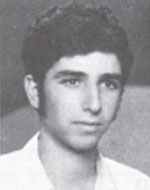Eliyahu (Eli), son of Yaffa and Shimon, was born on March 30, 1954 in Kfar Hadar, Hod Hasharon. He studied at the State elementary school in Ramatayim and continued his studies at the Mossinsohn High School in Magdiel, with the aim of mechanical frameworks. He was a good student and disciplined, diligent and persistent. He had his own original way of solving problems and doing crafts. A responsible child, and every task he was assigned to try to do in its entirety. Eli was smart and intelligent. His teachers and friends liked him, not because of his achievements in the grades, but because of his pleasant appearance, for he was a favorite boy. He was a nice naughty, one of those naughty ones everyone loves, speaks the truth and fights for something he thinks is right. After completing high school, he took advantage of his time until his enlistment and went to work in a profession he had learned to help his parents. Eli was a member of the Hanoar Haoved Vehalomed youth movement, a sports enthusiast and a soccer enthusiast and one of the members of the Hod Hasharon team. Eliahu was drafted into the IDF at the beginning of May 1972. His family was proud of him for being the first son in the army. He completed his training period successfully and was assigned to a course in the Signal Corps. When he finished, he was a good radio operator, responsible and devoted to his job, and did everything he was assigned with great precision. He rarely came home, but tried not to worry his parents, and did not complain about the hard and arduous training. In the letters he made sure to write home he said nothing about what happened to him in the army. His commanders gave him the “operational service signal”. Two weeks before Rosh Hashanah 5734 he was on a last vacation, and his parents tried to persuade him to ask for a transfer and to serve close to his place of residence: “If everyone wants to be in the rear, who will be on the front line?” Who did not come to the holiday two days before Yom Kippur, called his parents again and said that he was feeling well and asked not to worry about his safety, and that he could not come to Yom Kippur and hoped to celebrate Sukkot at home. In the northern sector of the Suez Canal, to serve as a wireless operator On October 7, 1973, after thirty hours of fighting, The men of the stronghold were ordered to retreat in the darkness of the night, retreating south-east and entering the city of Kantara, and encountered an Egyptian ambush, including tanks and Egyptian infantrymen. A number of soldiers were injured and the men were forced to split into two groups. One of the groups, which numbered about seventeen soldiers, hid in the room of one of the extremist houses on the way out of the city of Kantara. The group stayed there all day until the next day. On Monday, 8 October 1973, in the afternoon, they were discovered by Egyptian soldiers who surrounded the house and shot at them. An Egyptian officer went into the room, fired a pistol, and called for people to surrender. Of the group in the room, eight people stood up and left. The rest, about nine soldiers and among them, could not get up, or decided not to surrender, and remained there. The Egyptians threw grenades into it and fired bursts into it. The people who surrendered and returned from captivity said that all the people in the room were killed. Most of the witnesses did not recognize him by name and called him “the young connection.” At first Eli was considered to be absent. It was later declared as a space whose burial place was unknown. On December 31, 1973, his parents received notification of his death. After his body was identified, he was laid to rest in the military section of the Ramot Hashavim cemetery, Hod Hasharon. He left behind a father and mother. After his fall, he was promoted to sergeant. His parents donated in his memory prayer books to the synagogue of the Sephardi community in Hod Hasharon; In the A -In Ramatayim, his parents set up a nature room in his memory.
